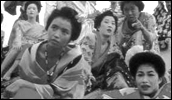Zegen
- Year
- 1987
- Original title
- Zegen
- Japanese title
- 女衒
- Director
- Cast
- Running time
- 120 minutes
- Published
- 17 July 2001



by Jasper Sharp
One of the less often mentioned works by the two-time Cannes-winning director of The Ballad of Narayama and The Eel, Zegen is an amusing satire on Japan's rather aggressive attempts at empire building during the early decades of the 20th century, suggesting why they ultimately failed so disastrously. Based on the autobiography of Iheiji Muraoka, a fervent patriot who set up a string of brothels stretching across South East Asia in anticipation of servicing the emperor's invading forces, it builds upon a number of the director's key themes as well as showcasing his keen eye for the ridiculous and the grotesque.
Imamura regular Ken Ogata plays Iheiji, who in 1901 jumps ship and is washed up in Hong Kong penniless and destitute. Here he assimilates into the sizeable Japanese expatriate community where he is soon set up as an apprentice barber. However, the Japanese Consulate there has higher goals for him in mind, and he is sent out to spy on Russian military activity in the Chinese province of Manchuria (which despite China's defeat in the Sino-Japanese War ten years previously, later ended up in the hands of Russia, then Japan's main rival in East Asia). His loyalty to the emperor proven, the mission earns Iheiji enough to invest in his first brothel, and in the following years he sets up a lucrative string of them running all the way down to Malaysia. Meanwhile his mother country's military activities, beginning with the war against the Russians in 1904 and continuing with the merciless sweep across Asia, begin to impinge seriously on both Iheiji and the girls who work for him.
A director long concerned with highlighting the shortcomings of "official" history, the colourful life-story of this Meiji-period Hugh Hefner seems to have been tailor made for Shohei Imamura. It provides an illuminating point of view to this crucial period in the nation's fortunes, firstly from a perspective based entirely outside of the country (there are no scenes inside Japan), and secondly from the grassroots level of this isolated Malaysian-based pocket of prostitutes and their panderer. In this respect Zegen is very much informed by Imamura's previous work, especially his 1975 documentary Karayuki-San, The Making of a Prostitute, which focused on "comfort women" forced abroad during the war years who have chosen not to return to their country.
Imamura suggests that the Japanese collective personality traits of national pride and duty coupled with an ignorance and indifference to its expatriate communities were ultimately responsible for its failure at expansionism. If colonialism ultimately equates to imposing an ideology onto another culture, then the less flexible that ideology in the first place, the more aggressively it needs to be imposed. Iheiji and his doxeys are all blindly loyal to their country, and in one scene he is quite taken aback when he is given a bit of a dressing down by a British diplomat who, on behalf of the international community, mentions that the world is beginning to get a little worried by Japan's militarism.
And so in this way, Iheiji and his extended family of prostitutes find themselves ostracised by the Malaysian locals. When his long-term love Shiho begins to stray, he decides to pitch himself into the task of expanding his own Japanese empire on foreign soil by vigorous attempts at procreating with his harem. After flashing forwards to 1941 he has seemingly achieved his goal by setting up his own microcosm of Japanese society, surrounded by hordes of obediently submissive offspring. But the fruitlessness of his blind loyalty is revealed when the now old man is brushed aside by the Japanese troops that he runs to greet as they invade Kuala Lumpur.
Zegen assumes some background on Asian history at the beginning of the 20th century, and without this requisite knowledge it may seem a little heavy going at times. Imamura's usual stylistic trope of maintaining an ironic distance by way of a series of scenes consisting of unbroken long or medium long shots result in a film that unfolds rather prosaically at first but whose episodic structure soon gathers weight towards the end whilst providing some memorable images in the meantime. Zegen is perhaps not a pivotal work in Imamura's oeuvre, but it fits neatly into the world vision developed throughout the rest of his body of work, and for that reason alone it is well worth a look.